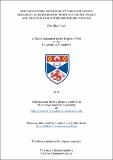Files in this item
Education for sustainability through action research: an exploration through theory, policy and practice in Scottish secondary schools
Item metadata
| dc.contributor.advisor | White, Rehema | |
| dc.contributor.author | Lloyd, Zoé Alise | |
| dc.coverage.spatial | xvii, 413 p. | |
| dc.date.accessioned | 2016-03-29T12:05:48Z | |
| dc.date.available | 2016-03-29T12:05:48Z | |
| dc.date.issued | 2015-12-18 | |
| dc.identifier.uri | https://hdl.handle.net/10023/8506 | |
| dc.description.abstract | Environmental deterioration and social injustice highlight the discrepancy between ‘educated’ and ‘wise’ and, by corollary, call into question our approach to education. In order to investigate how we might advance Education for Sustainability (EfS) in a Scottish secondary school context this research engages with: relevant theory, the educational policy context, and practice in the form of two action research pilot projects. The concepts of utopianism and design are proposed as original and potentially useful to understand, guide and evaluate EfS and are linked to an analytical framework to clarify the concept of EfS endorsed in this thesis. The analytical framework developed comprises four thinking modes: systems thinking; future thinking; an emphasis on values and priorities; and action competency, each qualified through reference to practice. The pilot projects highlighted the challenges of monitoring and evaluating; illustrated opportunities and challenges to deliver EfS theory; offered new theoretical insights into EfS implementation; and enabled reflection on the status of EfS in the wider curriculum. The challenge of undertaking action research as a postgraduate student led to critical analysis of action research in academia. The thesis highlights the potentially promising policy context to facilitate EfS, particularly in Scotland, but also the practical challenges to implement EfS. Such challenges include: concerns over the clarity of policy documents; teachers’ interest and ability to facilitate pupil-led learning; and resources to support the quality of EfS being delivered. Recommendations for future research include additional classroom-based projects; policy implementation analysis; and investigation of teachers’ values, attitudes and capacity. It was concluded that utopianism, design, and the four thinking modes can potentially contribute to qualifying EfS in current policy and facilitate pupils to critique the status quo, and develop and share alternative visions of a sustainable future. | en_US |
| dc.language.iso | en | en_US |
| dc.publisher | University of St Andrews | en |
| dc.rights | Attribution-NonCommercial-NoDerivatives 4.0 International | * |
| dc.rights.uri | http://creativecommons.org/licenses/by-nc-nd/4.0/ | * |
| dc.subject | Education for sustainability | en_US |
| dc.subject | Curriculum for excellence | en_US |
| dc.subject | Action research | en_US |
| dc.subject | Design thinking | en_US |
| dc.subject | Utopianism | en_US |
| dc.subject.lcc | HC79.E5L6 | |
| dc.subject.lcsh | Education, Secondary--Scotlan | en |
| dc.subject.lcsh | Sustainability--Study and teaching | en |
| dc.subject.lcsh | Action research | en |
| dc.title | Education for sustainability through action research: an exploration through theory, policy and practice in Scottish secondary schools | en_US |
| dc.type | Thesis | en_US |
| dc.type.qualificationlevel | Doctoral | en |
| dc.type.qualificationname | PhD Doctor of Philosophy | en |
| dc.publisher.institution | The University of St Andrews | en |
The following licence files are associated with this item:
This item appears in the following Collection(s)
Except where otherwise noted within the work, this item's licence for re-use is described as Attribution-NonCommercial-NoDerivatives 4.0 International
Items in the St Andrews Research Repository are protected by copyright, with all rights reserved, unless otherwise indicated.


